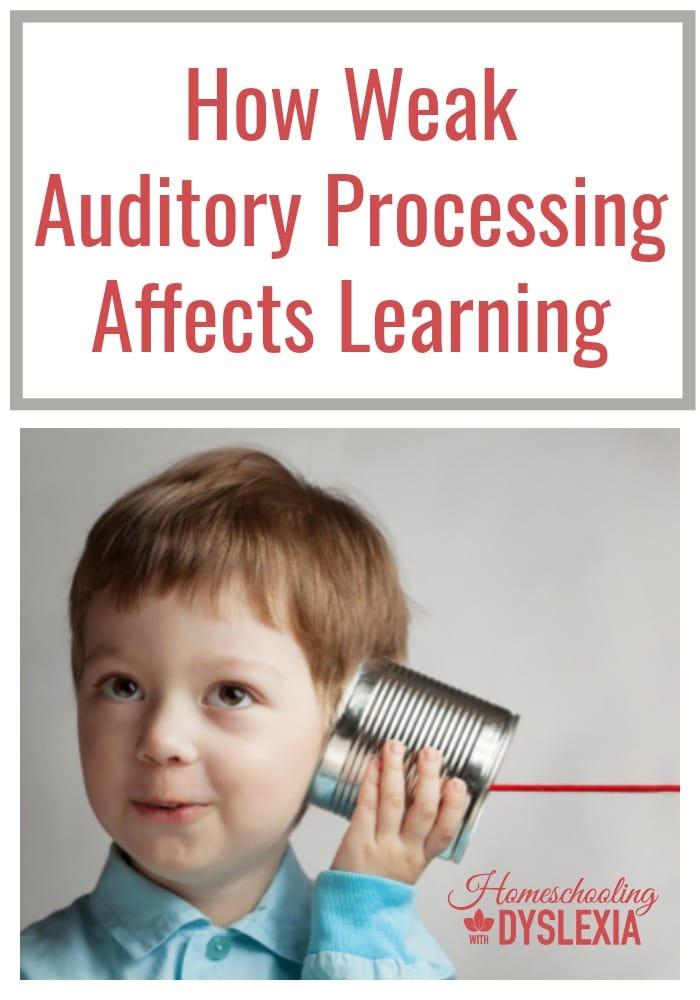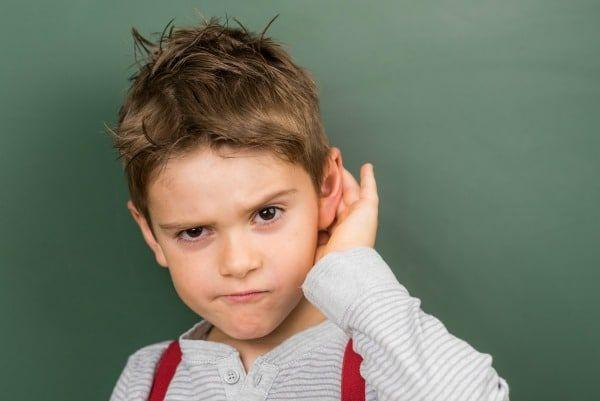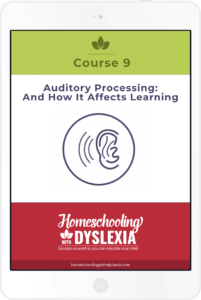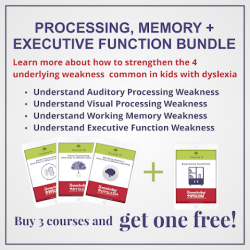Do you have a child that has trouble following directions, keeping up with conversations or understanding jokes, or has trouble with reading, spelling, speaking, or rhyming?
These could be a sign of auditory processing weakness or auditory processing disorder which are associated with many kinds of learning struggles.

What is Auditory Processing?
Our ears receive auditory information. This is hearing as we know it. Sounds are collected and then converted into a signal that passes along the auditory nerve to the brain. Auditory processing, simply defined, is what happens along this pathway and what the brain does with the auditory signal from the ears. So while a person may have perfect hearing, there may be an issue with what the brain does with those sounds that have been collected.
There are many aspects to Auditory Processing, some of which are listed below:
- Auditory attention: being able to “tune in” to auditory input.
- Auditory discrimination: the ability to distinguish between different sounds or words.
- Auditory sequential processing: how many pieces of information one can listen to, store, recall, and utilize.
- Auditory memory: ability to store and recall auditory information.
- Auditory sensitivity: perception of sound loudness
- Auditory figure-ground processing: ability to attend to and process auditory stimulus in the presence of background sound.
- Language processing: processing the meaning of verbal input. (This is not true auditory processing. It is the next step after auditory processing occurs.)
- Temporal processing: related to the “time” aspect of the auditory signal; rate of processing.
What is Auditory Processing Disorder?
Auditory Processing Disorder (APD) makes it difficult to recognize subtle differences between sounds in words, even when the sounds are loud and clear enough to be heard.
It can also be difficult to:
- tell where sounds are coming from,
- to make sense of the order of sounds,
- or to block out competing background noises.
APD affects the ability to process (hear and understand) what other people are saying.
Children with APD typically have normal hearing. But they struggle to process and make meaning of sounds. This is especially true when there are background noises.
Typically the brain processes sounds seamlessly and almost instantly. Most people can quickly interpret what they hear. But with APD, some kind of glitch delays that process.
Signs of Auditory Processes Weakness or Disorder
There are a lot of different signs of auditory processing weaknesses. Not all kids will have the same set of weaknesses or the same degree of weakness. Children with auditory processing weakness or disorder may:
- Find it hard to follow spoken directions, especially multi-step instructions
- Say “What?” a lot, even when they have heard much of what was said (which can look rude)
- Be easily distracted, especially by background noise or loud and sudden noises
- May misinterpret or have difficulty remembering oral directions; difficulty following directions in a series
- Have difficulty comprehending complex sentence structure or rapid speech
- Have trouble with reading and spelling, which require the ability to process and interpret sounds
- Misspell and mispronounce similar-sounding words or omits syllables; confuse similar-sounding words (celery/salary; belt/built; three/free; jab/job; bash/batch)
- Struggle with oral (word) math problems
- Find it hard to follow conversations
- Find it hard to learn songs or nursery rhymes
- Have trouble remembering details of what was read or heard
- May process thoughts and ideas slowly and have difficulty explaining them
- May be confused by figurative language (metaphor, similes) or misunderstand puns and jokes; interprets words too literally
Processing Problems at the Root of Reading Problems
A pioneer in reading disabilities, Samuel Orton, suggested that processing weaknesses either in the auditory or visual domain, or both, were at the root of developmental reading disorders.
Orton recognized that these weakness were not related to acuity in either the visual or auditory domain (these kids had normal hearing and vision when tested), but rather in the processing of information through the visual or auditory system.
Auditory Processing Problems Affect Phonemic Awareness
Dyslexia researcher David Kilpatrick has noted that children with dyslexia have poor phonemic awareness which is actually an auditory skill. If kids can’t properly hear the sounds in words, they cannot accurately ‘map’ these sounds to long term memory – a skill that is required for fluent reading.
Read more about how advanced phonemic awareness skills affect reading fluency.

Overcoming Auditory Processing Weakness or Disorder
Overcoming Auditory Processing weaknesses involves two interventions: accommodations and remediations.
- Accommodations offer supports to areas of weakness so that the auditory pathways aren’t overloaded.
- Remediations are treatments and programs that strengthen auditory processing.
Accommodations for Auditory Processing Weakness or Disorder
These are going to make life and school work much more efficient and pleasant for you and your kids with APD.
- Improved acoustics: Closing doors and windows minimizes outside noise.
- Use simple, one-step directions or provide a check list.
- Ask specific questions as you teach to find out if they do understand – avoid the lecture method of learning
- Supplement with their stronger senses (use visual cues, signals, handouts,
manipulatives) - Ask your child to repeat directions back to you, especially if he’ll need to act on the directions later, ask him to write notes to remind himself.
- Allow them 5-6 seconds to respond (“think time”)
- Have the student constantly verbalize concepts, vocabulary words, rules, etc.
- Have your child look at you when you’re speaking
- Use specific assistive technology apps and programs to support areas of weakness
How to Strengthen Auditory Processing
Many of the underlying weaknesses that affect kids with learning struggles, including processing lags, weak working memory and executive function can be strengthened with practice. While it is unlikely that these weaknesses will be eliminated all together – regular, targeted practice on areas of weakness can really help.
Several years ago, one of our kids was really struggling with learning. At 11-years old, even with intensive, professional, Orton-Gillingham tutoring, he was still unable to fluently read 3-letter words! We were desperate to find a way for him to learn. That’s when we switched from his OG tutor to an educational therapist.
The main difference between his OG tutor and his educational therapist, who did teach reading with the OG approach, was that she spent a good half of his 80-minute sessions doing activities to strengthen his visual and auditory memory and processing.
The results were amazing! That boy’s reading and learning took off that year!
It is important to note that while these games and activities helped to build our son’s auditory processing skills, for a child with dyslexia, these games are a supplement to an excellent Orton-Gillingham reading program.
Activities for Strengthening Auditory Processing
The following examples of games and activities can help improve listening skills. Remember to keep the activities fun and to only spend a short amount of time on any specific activity (5-10 minutes maximum).
Listening Walk
The purpose of the walk is to listen to sounds, particularly those they may not have been aware of previously. Before the walk you can suggest sounds to listen for or you can call the child’s attention to sounds as you walk along. After the walk, see how many sounds your child can remember and encourage him/her to describe them.
Intentional Listening
Practice listening to environmental sounds and guessing where the sounds are coming from and what is making them.
With their eyes closed ask your child to identify different noises e.g. clock ticking, coins rattling, squeaky toys, paper rustling, kettle boiling etc.
Have your child close their eyes and then move to different positions in the room. Call out to your child and see if they can guess from which direction your voice is coming from.
Games for Strengthening Auditory Processing
I Went to Grandma’s
This classic game helps kids with APD practice memory building skills important to communication. Begin the game by saying:
• I went to Grandma’s and in my suitcase I packed _____________.
• Then your child takes a turn and says:
• I went to Grandma’s and in my suitcase I packed [the object you listed] and ______________.
The goal is to keep building the story by going back and forth and seeing how far you can get adding onto the list. Just make sure to play the game slowly. For kids with APD, these kinds of auditory games cannot be rushed.
Simon Says
Play listening games such as Simon Says. Simon Says can also be played with your child imitating your speech sounds, volume changes, changes in pitch and rhythm changes.
Listening for sound patterns.
Have your child close his eyes or sit facing away from you. Clap your hands, play a drum, bounce a ball, etc. Have your child tell how many counts there were or ask him to repeat the patterns made. Rhythmic
patterns can be made for your child to repeat. For example: slow, fast, fast.
A New Parent Course!
These activities are just a sample of the the resources found in my new parent course on Auditory Processing and How it Affects Learning.

In this online parent course, you will learn:
- Understand processing issues is
- What Auditory Processing Disorder is
- How weaknesses in auditory processing affects learning, communication, social skills, and everyday life skills
- Specific types of auditory processing issues
- Signs of Auditory Processing Disorder in both in academic and real life situations
- How Auditory Processing Disorder is diagnosed
- The connection between Auditory Processing Disorder and other learning struggles like Dyslexia and ADHD
- Treatments for Auditory Processing Disorder
- Strategies for helping kids with Auditory Processing Disorder
- Best accommodations for Auditory Processing Disorder
- Assistive technology that helps with Auditory Processing Disorder
Visit the Course Page for more information about what our online parent education courses are or visit our Shop to purchase.

Get a bundle of Classes!
Save money by buying a bundle of classes. Purchase the Processing, Memory, and Attention Bundle and get four classes that help you understand the four underlying weaknesses associated with learning struggles.






Are there other free resources for children with auditory processing disorder? I’ve not seen much about it for homeschoolers, and so far everyone that I have seen is selling something guaranteed to cure… but it is hard to tell what is really useful.
The parent may also want to find out if the child’s auditory processing disorder might be as a result of dysfunction at the brain stem level known as Neuro-Developmental Delay (NDD). Should it be determined that the child’s problem is as a result of NDD, then therapy that targets stimulation at the brain stem level will be more beneficial to the child. I’ll be more than happy to answer any questions about NDD if any one needs more information.
Thank you Elizabeth!
If I think my child has Auditory Processing Disorder, what curriculum would you recommend? We are using Barton right now, but the rules almost seem overwhelming and there are so many of them!
Hi Michelle. Barton is a good program. It is a lot to learn for kids with APD. It takes time and lots of practice. As a general rule, the more multi-sensory your instruction is, the better. Sing, dance, touch and move to try to get the information to stick.
Is APD and Phological Dyslexia the same thing?
APD is one of the underlying causes of dyslexia, so yes, they are virtually the same thing.
Marianne, did you get your children actually diagnosed with Auditory Processing disorder? My dyslexic 2nd grader appears to have a lot of the points you mentioned, and I suspect APD. I made an appointment for an auditory assessment for APD. But then our pediatrician discouraged me. She said that there are other things that have similar symptoms, such as ADD or ADHD. The APD test wasn’t covered by insurance ($$$), and I got cold feet after speaking with our pediatrition and cancelled the appointment. Is it worth having a diagnosis for it to help guide accommodations and work with an educational therapist / occupational therapist. (FYI, we are not homeschoolers, so I’m trying to work with school on optimal learning environment for my son.)
We never had our kids tested just for auditory processing. When we had them tested, we told the tester the kinds of issues we were seeing and they chose the tests. I’m not a testing expert, so I don’t recall what the test was called, but they did test for auditory and visual processing as well as working memory and all the reading tests. Also, the schools can resist using your private testing so you would need to get more knowledgeable about your rights there. Wrightslaw.org is an excellent resource.
Hi Beth, My son’s developmental optometrist suspected he had an auditory processing issue and referred us to an audiologist. He was diagnosed about a year ago with APD. He now wears a customized ear filter. It has made such a difference for him! The audiologist provided a report with many recommendations. (He is currently homeschooled.) The evaluation was expensive but really worth it. Some states require insurers to cover the ear filter/hearing aid. In my son’s case, the APD co-exists with other issues. We are using All About Reading and All About Spelling and he is doing really well with both!
My daughter was diagnosed after
Second grade. The teacher wanted
Her to do summer school again but
It wasn’t helping. I knew something
Was wrong but I didn’t know what. We found a fantastic therapist in our area. Our daughter went there instead of summer school and made amazing progress over the summer. So glad we had her tested. This was
Probably 10 yes ago. She’s 18 now.
Is there an app or course for teenagers with auditory processing disorders?
There are different types of auditory processing disorder (APD) and some types, such as amblyaudia (lazy ear) and a spatial processing disorder can be completely remediated. A child with APD needs the correct type of treatment based on his/her profile in addition to appropriate accommodations. A comprehensive APD evaluation can determine the specific auditory processing deficits a child has so that treatment can focus on each child’s needs. There is not a one size fits all treatment. It must be individualized. Therefore, a diagnosis of APD will be helpful as long as the evaluation and recommendations are thorough. Auditory Processing Center specializes in assessment and treatment of auditory processing disorder and also offers telepractice services for APD evaluations and therapy. Visit http://www.auditorycenter.com for more information.
Thank you Alicia!